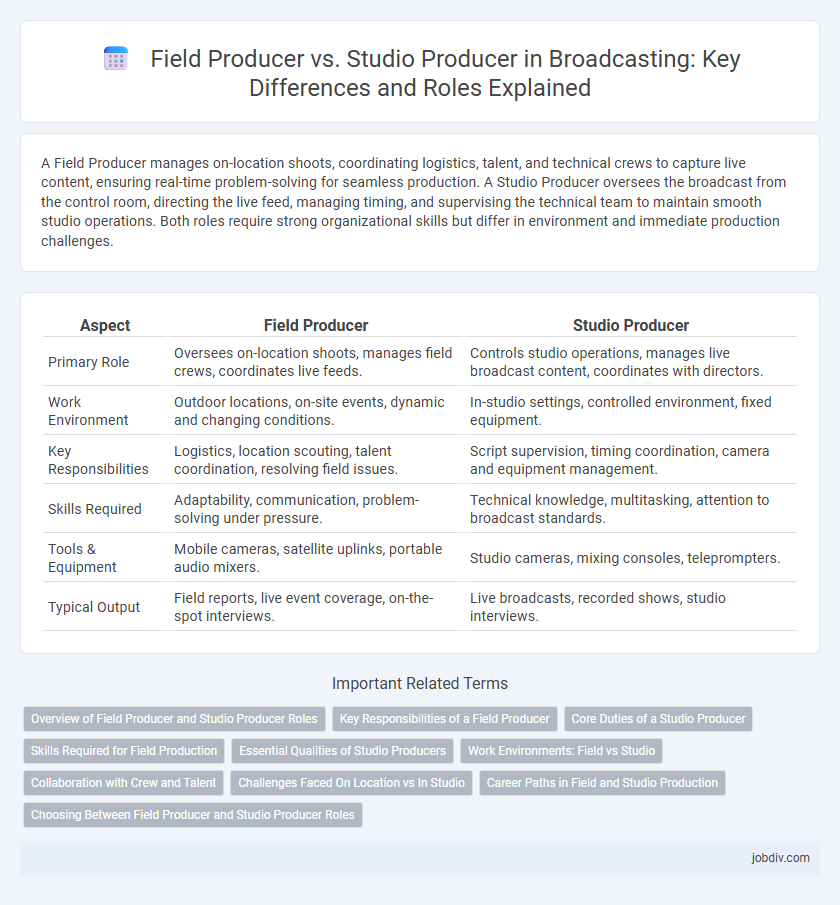A Field Producer manages on-location shoots, coordinating logistics, talent, and technical crews to capture live content, ensuring real-time problem-solving for seamless production. A Studio Producer oversees the broadcast from the control room, directing the live feed, managing timing, and supervising the technical team to maintain smooth studio operations. Both roles require strong organizational skills but differ in environment and immediate production challenges.
Table of Comparison
| Aspect | Field Producer | Studio Producer |
|---|---|---|
| Primary Role | Oversees on-location shoots, manages field crews, coordinates live feeds. | Controls studio operations, manages live broadcast content, coordinates with directors. |
| Work Environment | Outdoor locations, on-site events, dynamic and changing conditions. | In-studio settings, controlled environment, fixed equipment. |
| Key Responsibilities | Logistics, location scouting, talent coordination, resolving field issues. | Script supervision, timing coordination, camera and equipment management. |
| Skills Required | Adaptability, communication, problem-solving under pressure. | Technical knowledge, multitasking, attention to broadcast standards. |
| Tools & Equipment | Mobile cameras, satellite uplinks, portable audio mixers. | Studio cameras, mixing consoles, teleprompters. |
| Typical Output | Field reports, live event coverage, on-the-spot interviews. | Live broadcasts, recorded shows, studio interviews. |
Overview of Field Producer and Studio Producer Roles
Field producers coordinate on-location shoots, manage logistics, and gather footage that captures real-time events, ensuring content authenticity and storytelling accuracy. Studio producers oversee in-studio production processes, coordinate talent and technical crews, and manage the live broadcast or recorded segments to maintain smooth show flow and timing. Both roles require strong organizational skills but differ in their environment focus, with field producers operating in dynamic, external settings and studio producers controlling controlled, internal studio environments.
Key Responsibilities of a Field Producer
Field Producers manage on-location shoots, coordinating logistics, talent, and equipment to capture live or recorded content outside the studio environment. They handle real-time problem-solving, script adjustments, and ensure compliance with broadcast standards while maintaining communication between the remote crew and the main production team. Their role includes securing permits, scouting locations, and managing timing to deliver seamless, high-quality footage under dynamic conditions.
Core Duties of a Studio Producer
A Studio Producer manages the overall production process within the broadcast studio, coordinating technical teams, talent, and content flow to ensure seamless program delivery. Core duties include overseeing live broadcasts, scripting, timing, and integrating graphics, video feeds, and sound elements to maintain broadcasting standards. They serve as the central point of communication between directors, editors, and on-air personalities, ensuring production goals align with network requirements.
Skills Required for Field Production
Field producers require strong adaptability, excellent communication skills, and expertise in on-location troubleshooting to manage unpredictable shooting environments. Proficiency in camera operation, sound recording, and interviewing techniques is essential for capturing high-quality content in dynamic settings. Time management and quick decision-making abilities enable field producers to meet tight deadlines while ensuring production quality.
Essential Qualities of Studio Producers
Studio producers excel in managing live broadcasts by coordinating technical teams, talent, and on-air content to ensure seamless production flow. They possess strong decision-making skills and attention to detail, crucial for real-time problem solving and maintaining broadcast quality. Effective communication and leadership are essential qualities that enable studio producers to direct studio operations and respond swiftly to unexpected challenges.
Work Environments: Field vs Studio
Field producers operate in dynamic, on-location environments, managing live shoots, coordinating crews, and troubleshooting in unpredictable conditions. Studio producers work within controlled settings, overseeing set design, camera operations, and live broadcasts to ensure seamless production flow. The distinct work environments require field producers to adapt quickly to external variables, while studio producers focus on stability and precision within the broadcast studio.
Collaboration with Crew and Talent
Field Producers coordinate on-location shoots by managing the crew and directing talent to capture authentic content, ensuring smooth logistical integration. Studio Producers collaborate closely with technical teams and on-air talent, orchestrating live broadcasts with precise timing and cue management. Both roles require strong communication skills and adaptability to synchronize creative vision with production demands.
Challenges Faced On Location vs In Studio
Field Producers encounter challenges such as unpredictable weather, technical difficulties with remote equipment, and fast-paced decision-making under time constraints while managing on-site talent and crew. Studio Producers face issues like coordinating live broadcasts, managing complex control room operations, and ensuring seamless communication between directors, editors, and on-air personalities. Both roles require adaptability, but on-location production demands greater logistical coordination and real-time problem-solving in dynamic environments.
Career Paths in Field and Studio Production
Field producers typically pursue dynamic careers involving on-location shoots, managing logistics, and coordinating with crews to capture live or recorded content, often gaining skills in real-time problem-solving and adaptability. Studio producers usually follow a path centered around orchestrating in-studio productions, overseeing technical elements, script development, and post-production processes to ensure seamless broadcasts. Both career paths require strong leadership and communication abilities but differ in their emphasis on environment-specific challenges and technical expertise.
Choosing Between Field Producer and Studio Producer Roles
Choosing between a Field Producer and a Studio Producer role depends on the production environment and skill set requirements. Field Producers excel in on-location reporting, managing live shoots, and coordinating logistical elements, whereas Studio Producers specialize in managing in-studio content, live broadcasts, and directing control room operations. Understanding the demands of dynamic field conditions versus controlled studio settings is crucial for aligning roles with career goals in broadcasting.
Field Producer vs Studio Producer Infographic

 jobdiv.com
jobdiv.com